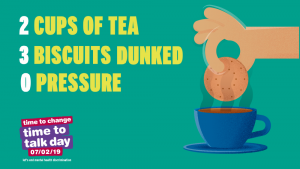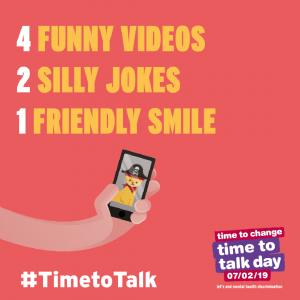As it’s Time To Change’s Time to Talk Day 2019 we asked our friendmental health author Martin Baker to guest blog for us!
I’m grateful for the invite to write for RACES AROUND THE WORLD to mark #TimeToTalkDay. This year’s theme is “bringing together the right ingredients to have a conversation about mental health.” But what are those right ingredients?

In our book, High Tide, Low Tide: The Caring Friend’s Guide to Bipolar Disorder, my best friend and coauthor Fran Houston and I described what we believe are the key skills and attributes for a successful caring friendship where one friend lives with mental illness.
“…. while there is no great secret to share, there are qualities which are crucial to our success as friends. We trust each other, we are open and honest, and we love to connect.” (High Tide, Low Tide: The Caring Friend’s Guide to Bipolar Disorder, Chapter 1, “The Caring Friendship.”)
These same qualities — trust, openness, honesty, and a willingness to connect — enable the kind of safe space for people to share what might be going on for them. What does this look like, though? How can we hold that safe space in which to meet and share? Meaningful conversations require trust on both sides. Each person needs to trust the other, and themselves. Can I trust you to hear what I need to say without judging me? Do I trust myself to hold space for you to share what is going on for you?

These are not trivial questions. It can be hard to hear what someone is saying without interrupting, without judging them or their situation, without offering fixes or our own stories, thinking our experiences must be helpful and wanted. (“Oh that happened to me a few years ago, let me tell you what I did …”) Honesty can also be intensely challenging. What you hear may trigger responses in you that you did not anticipate, or find difficult to handle. It’s okay to acknowledge this honestly and let the person know you are unable to be present for them right now.
Openness isn’t necessarily about sharing everything with everyone. In fact, it is unhealthy and unwise to do so unless you are very sure of the other person and your relationship. Likewise, don’t insist or expect the other person to open fully to you all at once. Give yourselves permission to share only as much as you both feel comfortable with. That said, pay attention to what might lie behind or between the words being spoken.

Perhaps the most important ingredient is the willingness to connect. Be the person — perhaps the only person in your friend’s life — who will hear them; who won’t judge or make excuses, ignore a call or run away. Let people know you are open to talk — and to listen — when they need someone to be there. This doesn’t mean dropping everything every time at a moment’s notice, but it does mean making a commitment never to ignore a phone call, a text or an instant message. That commitment itself can be a powerful thing.
Living with mental illness isn’t all about crises and suicidal thinking, of course. There’s no reason why mental health shouldn’t be as accepted and regular a topic of conversation as any other aspect of our lives. You will learn a lot, about the other person for sure but also about yourself. You know what they say. It’s good to talk. It’s even better to listen.
About the Author
Martin Baker graduated in pharmacy from the University of Bradford in 1983 and completed three years’ postgraduate research at the Institute of Psychiatry, King’s College London. Despite this background he had little awareness of mental illness until a chance online encounter in 2011 with American writer and photographer Fran Houston.
Fran lives with bipolar disorder and other conditions. Despite living 3,000 miles apart Martin became – and remains – Fran’s primary caregiver. Their book High Tide, Low Tide: The Caring Friend’s Guide to Bipolar Disorder inspires and informs others who support a friend or loved one living with a mental health condition.
Certified in Mental Health First Aid (MHFA) and ASIST, Martin is a member of NAMI, Mind, and Bipolar UK. He is a Champion of the Time to Change anti-stigma campaign led by Mind and Rethink Mental Illness.
You can contact Martin on his website/blog (www.gumonmyshoe.com), Twitter (@GumOnMyShoeBook) or Facebook (www.facebook.com/MartinBakerAuthor).
If you are struggling with your mental health, remember you are not alone and can reach out to the following:
Samaritans (UK and Ireland)
08457 90 90 90 (UK)
1850 60 90 90 (Republic of Ireland)
www.samaritans.org
jo@samaritans.org
National Suicide Prevention Lifeline (USA)
1-800-273-TALK (8255)
www.suicidepreventionlifeline.org
There are also online support services for those who cannot, or prefer not to, use the phone:
Crisis Text Line offers a free, 24/7 (USA) text line for people in crisis. Text 741741 to connect with a live, trained crisis counselor. (www.crisistextline.org)
Dial House (Leeds, UK) offers support in person, by phone, British Sign Language (BSL), text, and Skype. (www.lslcs.org.uk/services/dial-house)
Safeline (UK) offers support to people in their journey through sexual abuse and rape, by email, phone, live chat, and social media. (www.safeline.org.uk)

